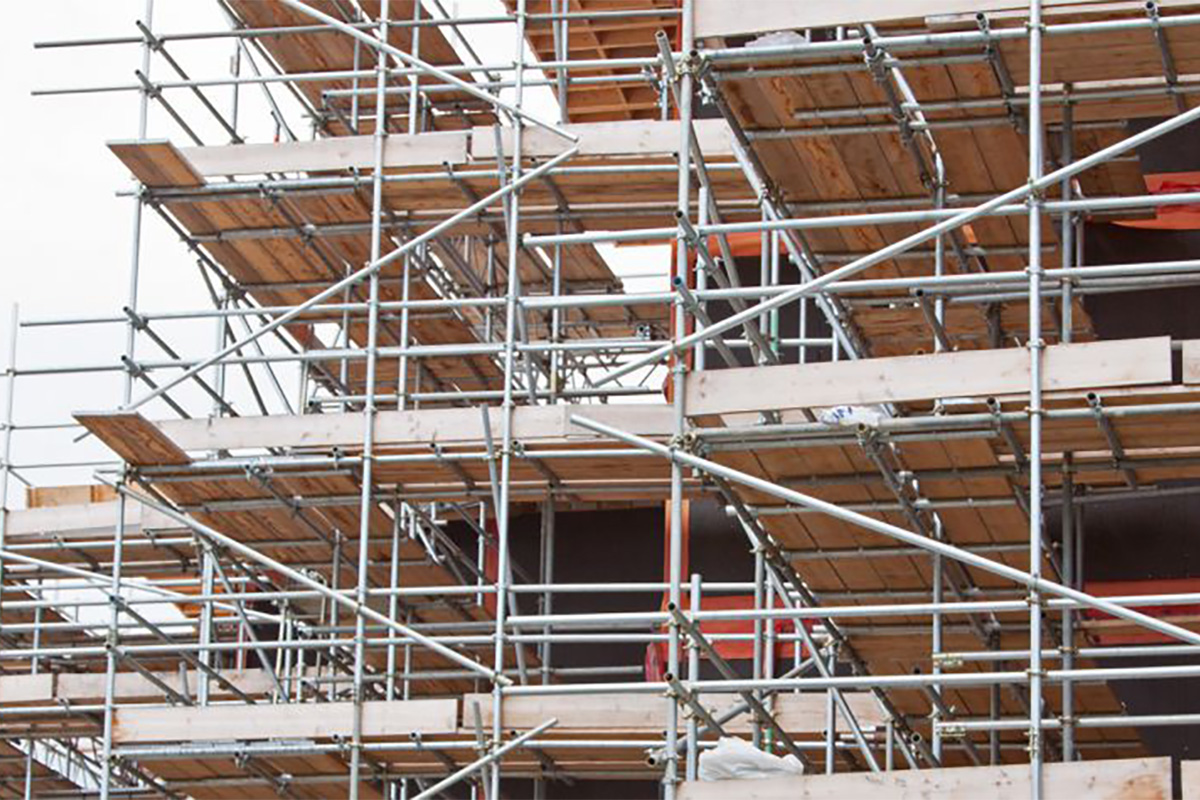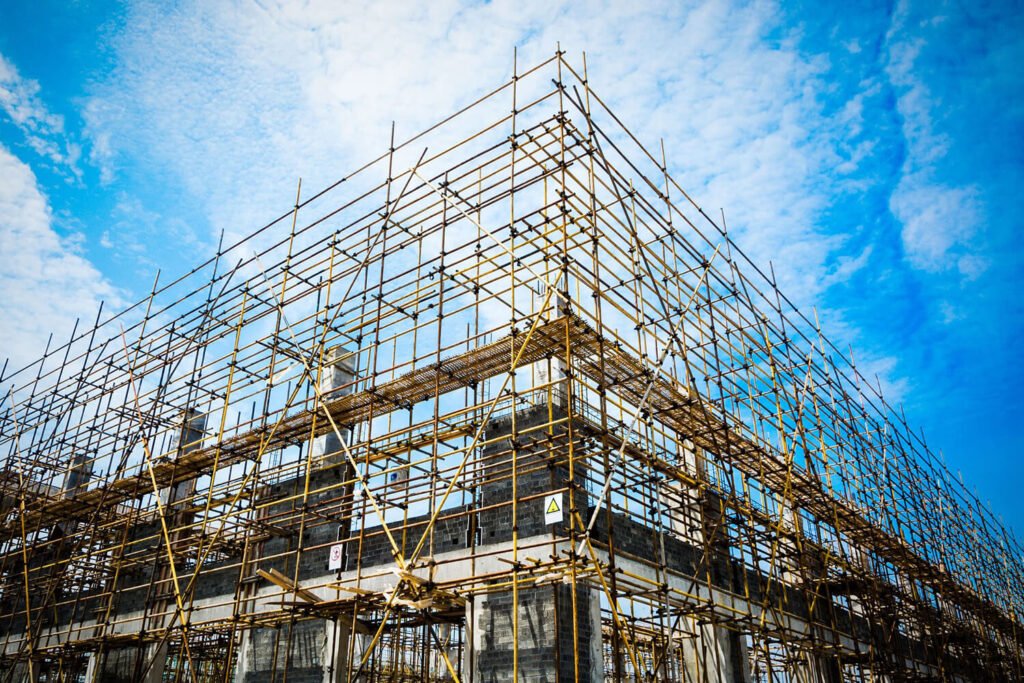Get the Best Scaffolding Cobham Services for Your Building Projects
Get the Best Scaffolding Cobham Services for Your Building Projects
Blog Article
Exploring the Numerous Sorts Of Scaffolding Utilized in Building And Construction Projects
The building industry depends heavily on numerous kinds of scaffolding to satisfy certain task demands, each offering unique benefits and applications. Typical structure scaffolding gives a durable foundation for basic tasks, while suspended scaffolding is crucial for job on skyscraper frameworks.

Traditional Structure Scaffolding
Conventional frame scaffolding is just one of one of the most widely made use of approaches in the building market because of its effectiveness and adaptability. This system is composed of horizontal and upright frames that are put together to produce a secure system for products and workers. The major parts consist of vertical articles, horizontal journals, and angled braces, which with each other give a solid structure that can sustain substantial lots.
One of the key advantages of standard structure scaffolding is its versatility to numerous building and construction jobs, varying from property structures to big business frameworks. The modular design enables simple assembly and disassembly, making it reliable for both temporary and lasting jobs. Additionally, the system can be tailored in height and size, accommodating different structure styles and website conditions.
Safety is critical in scaffolding applications, and standard frame systems are furnished with guardrails and toe boards to stop falls and make sure worker defense. Additionally, regular examinations and adherence to security policies are essential in preserving the stability of the scaffold. On the whole, typical structure scaffolding continues to be an essential option in the building and construction market, giving a reputable system for labor and enhancing overall task effectiveness

Suspended Scaffolding
Suspended scaffolding supplies a special remedy for building and construction projects that require access to elevated surfaces, especially in situations where conventional structure scaffolding might be not practical. This type of scaffolding is normally suspended from the roofing system or upper levels of a framework, utilizing a system of ropes, pulley-blocks, and systems to create a working room that can be adjusted to different heights.
One of the key advantages of put on hold scaffolding is its adaptability. It can be quickly rearranged or reduced to suit modifications in construction requirements, making it ideal for jobs such as home window installation, façade job, and maintenance on high-rise buildings. Furthermore, the marginal impact of suspended scaffolding permits much better use ground area in city environments, where space is usually limited.
Safety is an essential factor to consider in making use of put on hold scaffolding. Correct rigging and anchoring systems should be used to make certain stability and prevent mishaps. Operators must also be learnt the secure use of this devices. In general, suspended scaffolding gives a reliable and effective remedy for accessing hard-to-reach areas in different building circumstances, boosting both efficiency and safety and security on website.
System Scaffolding
System scaffolding, commonly concerned as a modern-day solution in the scaffolding market, contains pre-engineered components that can be swiftly put together and adjusted for numerous building tasks. Scaffolding. This kind of scaffolding is defined by its modular design, which enables for adaptability and efficiency on task sites, accommodating architectural needs and various heights
Generally made from high-strength steel or light weight aluminum, system scaffolding provides enhanced longevity and stability. The parts include upright posts, horizontal ledgers, and angled braces, which interconnect safely, making sure a durable structure. The design commonly integrates standard fittings, streamlining setting up and disassembly processes, thus decreasing labor time and prices.

Rolling Scaffolding
Moving scaffolding is a functional choice to typical set scaffolding, created for wheelchair and convenience of use on construction websites. This sort of scaffolding includes a platform supported by structures with wheels, permitting employees to easily transfer it as needed. The movement attribute considerably boosts performance, as it lessens downtime associated with taking apart and setting up taken care of scaffolding.
Generally created from light-weight materials such as aluminum or steel, rolling scaffolding uses a strong yet mobile solution for jobs calling for regular click here to find out more repositioning - Scaffolding. It is particularly beneficial in jobs such as paint, drywall setup, and have a peek at these guys electric work, where accessibility to numerous heights and areas is essential
Security is vital in rolling scaffolding layout, with features such as securing wheels to stop unexpected motion when in operation, and guardrails to secure employees from drops. Furthermore, lots of models are adjustable in height, fitting various task demands.
Cantilever Scaffolding

The style of cantilever scaffolding generally entails utilizing braces or arms anchored to a building or structure, enabling the system to extend outside safely. Safety and security is extremely important; hence, these scaffolds need to be crafted to endure ecological conditions and numerous lots. Regular assessment and maintenance are vital to ensure structural stability and worker security.
Cantilever scaffolding is preferred for its adaptability and efficient use of room, making it a prominent selection in metropolitan settings where room constraints prevail. It promotes less complicated access to high altitudes, inevitably contributing to the total efficiency of building scaffolding que es tasks. Just like all scaffolding kinds, appropriate training and adherence to safety and security requirements are critical for employees making use of cantilever scaffolding.
Verdict
Finally, the varied sorts of scaffolding utilized in building and construction jobs each serve unique objectives customized to certain site needs. Conventional frame scaffolding offers security, while put on hold scaffolding provides versatility for raised jobs. System scaffolding assists in fast setting up, and rolling scaffolding improves movement for varying workplace. Cantilever scaffolding effectively resolves barriers in city settings. Comprehending these scaffolding types is vital for optimizing safety and security and performance in building, inevitably adding to the effective completion of jobs.
Typical framework scaffolding offers a strong structure for general jobs, while put on hold scaffolding is crucial for job on skyscraper frameworks.Moving scaffolding is a functional option to traditional fixed scaffolding, designed for mobility and simplicity of usage on construction sites. As with all scaffolding kinds, proper training and adherence to safety criteria are essential for workers making use of cantilever scaffolding.
Traditional frame scaffolding provides stability, while put on hold scaffolding offers adaptability for raised jobs. System scaffolding helps with fast assembly, and rolling scaffolding boosts flexibility for differing job atmospheres.
Report this page